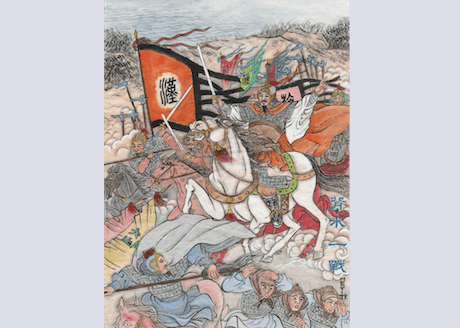Han Xin (about 256–195 B.C.) was a military strategist and general who contributed greatly to the founding of the Han dynasty (206 B.C.– A.D. 220).
Having conquered the State of Wei in 205 B.C., Han Xin was immediately ordered to attack the State of Zhao. There were 200,000 soldiers in the Zhao army, while Han Xin led a force of only about 30,000 soldiers.
The Zhao army had a favorable position and had already blocked an important pass to the Zhao state. The pass was on the west side of Taihang Mountain, with a river flowing in front of it.
Han Xin knew very well the unfavorable conditions his troops were in. He was also aware that his soldiers were tired after the long journey and their supplies could easily be cut off by Zhao soldiers. He devised a plan.
Han ordered the majority of his army to move across the river and form up facing the Zhao camp, 30 miles away from the pass. Then he had some soldiers make trenches and fortifications.
The generals and soldiers of Zhao laughed at Han Xin for what seemed a tactical mistake, as there was no way to retreat with the river behind them, in case of defeat. Han Xin was unmoved.
He had secretly ordered a squad of 2,000 soldiers to infiltrate Zhao’s camp and to place the flags of Han visibly in the camp as soon as the Zhao soldiers left it.
In the middle of that night, Han Xin asked soldiers to eat only snacks and promised they would feast the next day upon destroying the Zhao army. Although they followed his orders, not even his own officers believed him.
The next morning, Han Xin ordered his army to march toward the pass with flags and drums. The main forces of Zhao left their camp to pursue the Han army.
Han Xin immediately ordered the soldiers to withdraw into the prepared positions. The Zhao army was in hot pursuit. Han’s soldiers had no choice but to fight desperately, which made the Zhao soldiers afraid.
In order to regroup for further action, the Zhao generals ordered their troops to withdraw from the skirmish. When the Zhao soldiers retreated to their camp, they found it was bristling with the flags of Han.
They thought they had been attacked from the rear and panicked. At this point, Han Xin attacked with everything he had, and the Zhao army was crushed.
During the feast to celebrate the victory, Han Xin was asked why he had lined his men up with a river at their backs. He answered: “In such a situation, a man will fight because it is impossible to flee. If they were put in a place from which it was possible to retreat, they would do so.”
This strategy gave rise to the idiom 背水一戰 (bèi shuĭ yī zhàn), which literally means “fighting a battle with one’s back to the river.”
It is used to describe a situation in which one has to fight to win or die, or a moment when one has to make do-or-die efforts.




